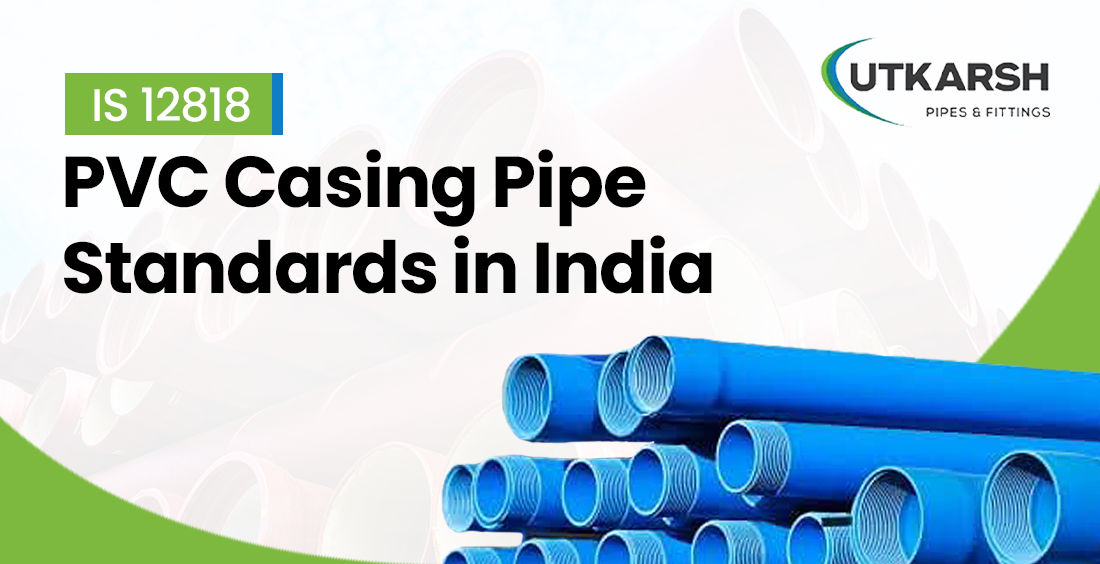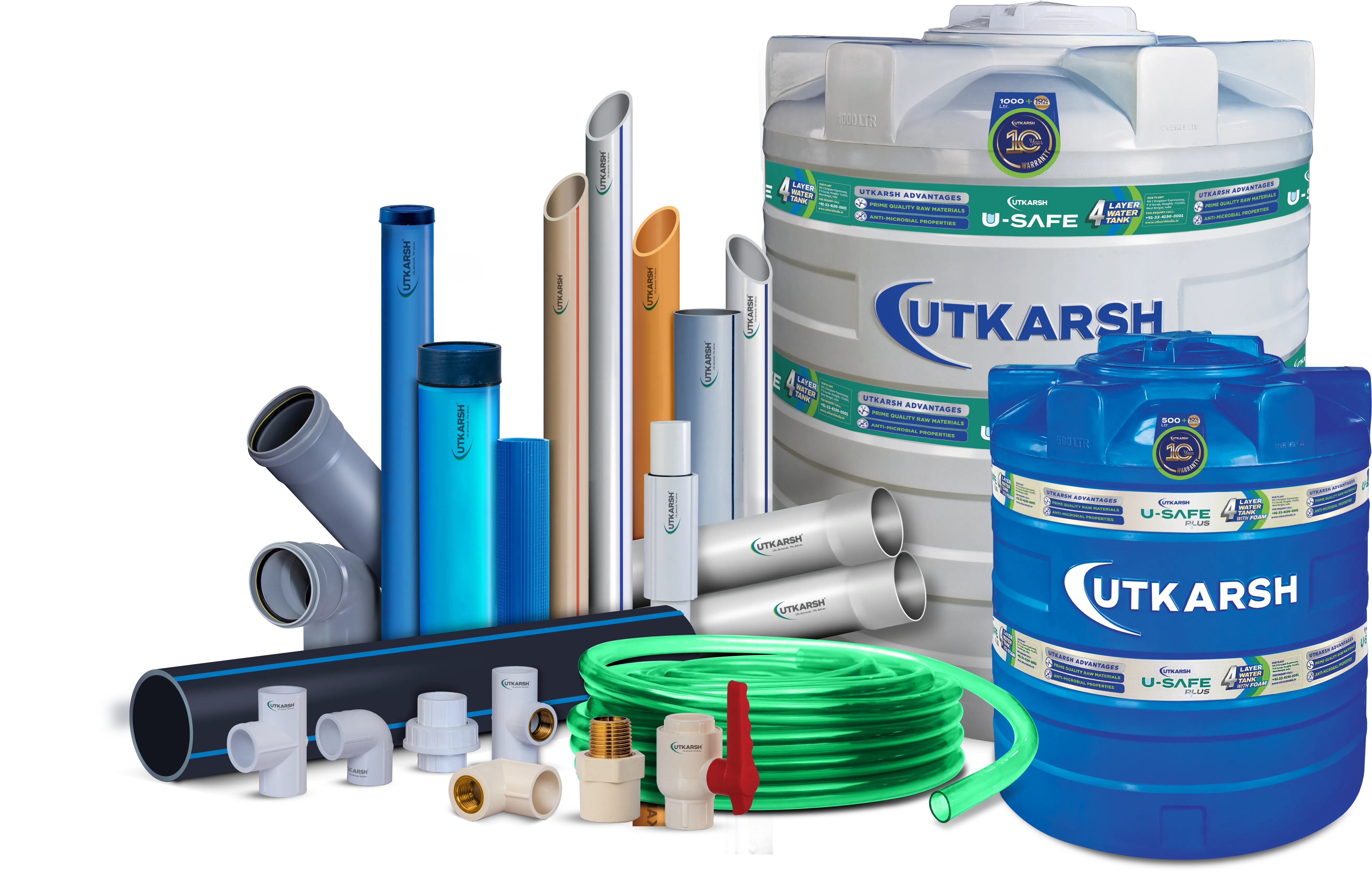IS 12818: PVC Casing Pipe Standards in India

Borewells and deep-soil water reserve extraction rely heavily on high-performance casing pipes, and PVC casing pipes have become the preferred choice due to their strength, durability, and corrosion resistance. Since borewells operate under extreme underground conditions, the risk of pipe deformation or collapse is high if substandard materials are used.
To ensure safety, performance, and long-term reliability, Bureau of Indian Standards has established IS 12818, a standard that defines the quality and performance benchmarks for PVC casing pipes used in borewell and similar applications.
Whether you are involved in civil construction, agricultural water extraction, or borewell installation, understanding IS 12818 is essential. This standard directly impacts operational efficiency, pipe lifespan, cost-effectiveness, and overall water safety.
What is IS 12818 and Why It Matters
IS 12818 specifies the technical requirements for PVC casing pipes used in boreholes. Compliance with this standard ensures:
High structural strength
Resistance to underground pressure
Reduced chances of collapse or deformation
Safe and contamination-free water extraction
Using IS 12818-compliant pipes also adds tangible value to projects by improving reliability and reducing long-term maintenance costs.
1. Categories of PVC Casing Pipes as per IS 12818
As per BIS classification, PVC casing pipes are divided into the following categories based on borewell depth and soil pressure:
CS (Casing Shallow): Suitable for shallow borewells where soil pressure is low.
CM (Casing Medium): Designed for moderate depths with medium soil pressure.
CD (Casing Deep): Ideal for deep borewells where soil pressure and external forces are extremely high.
SC (Screen Casing): Perforated pipes that allow water entry while filtering sand and loose particles, especially useful in sandy soil conditions.
Choosing the correct category ensures borewell stability and uninterrupted water flow. For a deeper understanding of their advantages, explore the benefits of casing pipes in borewell installation.
2. Material and Durability Requirements
IS 12818 places strict emphasis on material quality to ensure long service life and consistent performance. Key requirements include:
High-quality virgin UPVC: Only unplasticized PVC is permitted to meet strength and rigidity standards.
Chemical resistance: Pipes must resist corrosion and chemical reactions from groundwater minerals.
High impact strength: Essential to withstand underground pressure and external loads.
UV resistance: Pipes exposed above ground must include UV stabilization to prevent degradation.
Meeting these criteria ensures low maintenance and extended borewell lifespan.
Also Read: Factors Affecting the Lifespan of PVC Casing Pipes
3. Threading and Jointing Specifications
Proper jointing is critical for maintaining borewell integrity and water quality. IS 12818 specifies:
Precision threaded joints for secure and stable connections
Leak-proof sealing to prevent contamination and water loss
Easy installation, thanks to lightweight construction and standardized threading
These features simplify installation while ensuring long-term reliability.
4. PVC Casing Pipe Price and Factors Affecting Cost
PVC casing pipe price depends on several important factors:
Pipe category: CD pipes are costlier than CS due to higher strength requirements
Diameter and wall thickness: Larger and thicker pipes increase material usage and cost
Brand and compliance: Certified manufacturers adhering to IS 12818 may charge a premium
Market conditions: Raw material prices and seasonal demand impact overall pricing
For the best value, always compare suppliers and ensure strict compliance with IS 12818.
Why Choosing the Right PVC Casing Pipe Is Crucial
Selecting the right casing pipe is vital for borewell efficiency and durability:
Prevents borewell collapse under high soil pressure
Improves water flow efficiency by minimizing friction losses
Reduces contamination risks through secure jointing
Offers long-term cost savings by minimizing replacements
Investing in quality pipes upfront significantly reduces operational issues later.
Utkarsh Pipes and Fittings – Trusted PVC Casing Pipe Manufacturers
Utkarsh Pipes and Fittings is a trusted name in the piping industry, offering IS 12818-compliant PVC casing pipes engineered for performance and durability. As a reputed pvc products manufacturer, Utkarsh delivers solutions that meet the demands of modern borewell applications.
Ideal for borewells: Designed for stability in collapsible and loose soil
High strength & reliability: Manufactured using premium-grade UPVC
Wide applicability: Suitable for deep and shallow borewells, agriculture, and industrial use
Proven trust: Widely used in residential, commercial, and municipal water projects
For projects that demand reliability and long-term performance, Utkarsh Pipes and Fittings remains a dependable choice.
Conclusion
IS 12818 plays a crucial role in defining the quality and performance of PVC casing pipes used in borewells across India. Understanding pipe categories, material requirements, jointing specifications, and pricing factors helps in making informed decisions. Always source products from reliable PVC casing pipe manufacturers and established pvc products manufacturers like Utkarsh Pipes and Fittings to ensure durability, safety, and value.
FAQs:
Is the ISI mark mandatory for PVC casing pipes?
Yes, the ISI mark is mandatory for PVC casing pipes used in borewells and drinking water applications, as it confirms compliance with BIS quality and safety standards.
What are the standard sizes of PVC casing pipes?
As per IS 12818, standard diameters typically range from 100 mm (4 inches) to 400 mm (16 inches), with varying wall thicknesses based on pipe category.
How do I select the right casing pipe size?
Pipe size depends on borewell diameter, depth, and soil conditions. The casing pipe should generally be 1–2 inches larger than the pump diameter.
What is the difference between CS, CM, and CD casing pipes?
CS pipes are for shallow depths, CM for medium depths, and CD for deep borewells with high soil pressure.
How long do IS 12818-compliant PVC casing pipes last?
With proper installation, they can last 30–50 years depending on soil conditions and water chemistry.












